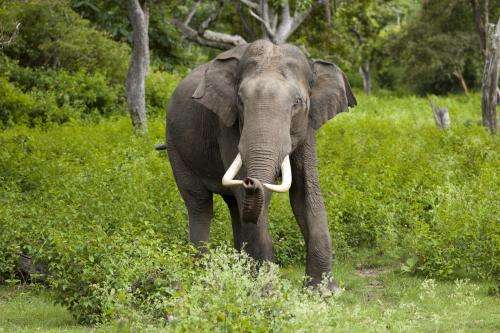Teen elephant mothers die younger but have bigger families, study finds

Asian elephants that give birth as teenagers die younger than older mothers but raise bigger families during their lifetime, according to new research from the University of Sheffield.
Experts from the University's Department of Animal and Plant Sciences studied the reproductive lives of 416 Asian elephant mothers in Myanmar, Burma, and found those that had calves before the age of 19 were almost two times more likely to die before the age of 50 than those that had their first offspring later.
However, elephants that entered motherhood at an earlier age had more calves following their teenage years than those that started reproducing after the age of 19.
The team's findings will help maximise fertility in captive and semi-captive elephants, reducing the strain on the endangered wild population.
Research found that Asian elephants, which can live into their 70s, could give birth from the age of five.
Yet surprisingly, for a species that live as long as humans do, their fertility peaked on average at the age of 19 before declining.
The team also found elephants that gave birth twice in their teenage years had calves three times more likely to survive to independence than those born to mothers who had their first young after the age of 19.
Therefore, although having calves as a teenager reduced a mother's lifespan, early reproduction was favoured by natural selection because those mothers raised the largest families in their lifetime.
Dr Adam Hayward, of the University of Sheffield's Department of Animal and Plant Sciences, said: "Understanding how maternal performance changes with age and impacts on later-life survival and fertility is important. Asian elephants are endangered in the wild and low fertility in captivity necessitates acquisition of elephants from the wild every year to maintain captive populations.
"Our research was carried out on semi-captive Asian elephants working in timber camps in Myanmar.
"As religious icons in South-east Asia and a key species of the forest ecosystem, their decline is of serious cultural and ecological concern.
"Our results will enable the management of captive and semi-captive elephants to be tailored to maximise fertility, reducing strain on the wild population."
Virpi Lummaa, Reader of Evolutionary Biology at the University of Sheffield, added: "We rarely get the opportunity to study how other species with a lifespan similar to humans grow old.
"This study represents a unique analysis of the ageing process in a similarly long-lived mammal.
"It also supports the evolutionary theory that selection for high fertility in early life is energetically demanding, which accelerates declines in survival rates with age which are typical of most animals."
Provided by University of Sheffield



















